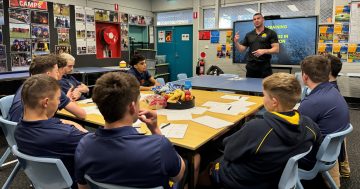Jenny Anderson* says the world of work is changing, but the career aspirations of teenagers are not.
 In 2000, the Organisation for Economic Cooperation and Development (OECD) asked 15-year-olds what they wanted to be when they grew up.
In 2000, the Organisation for Economic Cooperation and Development (OECD) asked 15-year-olds what they wanted to be when they grew up.
Some 47 per cent of boys and 53 per cent of girls picked 10 careers, including doctors, teachers, lawyers and business managers.
In 2018, the OECD asked again.
Though the nature of work has changed dramatically since the turn of the century, kids’ answers have not: An even larger share of both boys and girls said they wanted to go into the same 10 professions.
“The future that students see for themselves does not square with the future of work,” said Andreas Schliecher, head of the Education Directorate at the OECD.
He said that schools and teachers should do more to make sure kids know about the diverse range of careers that exist, noting that kids who are exposed to more kinds of work, either through internships or job fairs, tended to like school more.
“The more time they invest in career activities, the more they see the value of school,” Schliecher said.
He said there were some mismatches in the data.
Among students who were top performers in maths and science, for example, a far greater proportion of boys picked a career in maths and science-related fields than girls (in Finland, Estonia and Serbia, that gap was the smallest).
High-performing students from more disadvantaged backgrounds, meanwhile, are far less likely to say they will pursue higher education.
While education can’t make everyone perform the same, Schliecher said, it should help equalise what equally high performers do.
The report uses data from PISA, a test administered to 15-year-olds in 79 countries and territories every three years, as well as survey responses.
It was released last week during the second World Economic Forum summit in Davos, Switzerland.
In the report, Germany and Switzerland stand out for having the most diverse set of career expectations, reflecting “the strength of career guidance and exposure to a variety of occupations in these countries”, the report says.
Studies show that teenage career aspirations are a good predictor of the jobs they go on to get.
While it may seem crazy to start thinking about work in primary school, Nick Chambers, CEO of Education Employers, a charity that aims to bridge the gap between work and school, said it’s not about picking a career as much as knowing how many interesting ones are out there.
For the survey portion of the study, the OECD teamed up with Education Employers, who asked 14 to 18-year-olds what issues mattered to them, their career aspirations, and their concerns about the future (they had 8,000 responses, 80 per cent of which were from the UK).
The most desired careers were in:
- Art and culture, entertainment, sport (22 per cent).
- Health, social care, social work (20 per cent).
- Legal, professional, scientific and technical (16 per cent).
- Education (16 per cent).
But these do not match where there are vacancies, Chambers said.
Students seem to have processed the news about letting the machines do the maths: the most important skills they think they will need for work include communication (55 per cent), determination (38 per cent) and people skills (32 per cent), with numeracy and digital skills coming in a surprisingly low 9 per cent each.
The study found that parents were the biggest influence on young people’s aspirations, and in a touching bit of news for them, family was cited as the most important “issue” at 45 per cent, followed by 41 per cent for health and 31 per cent for education.
* Jenny Anderson is a senior reporter for Quartz in London. She tweets at @jandersonQZ.
This article first appeared at qz.com.











